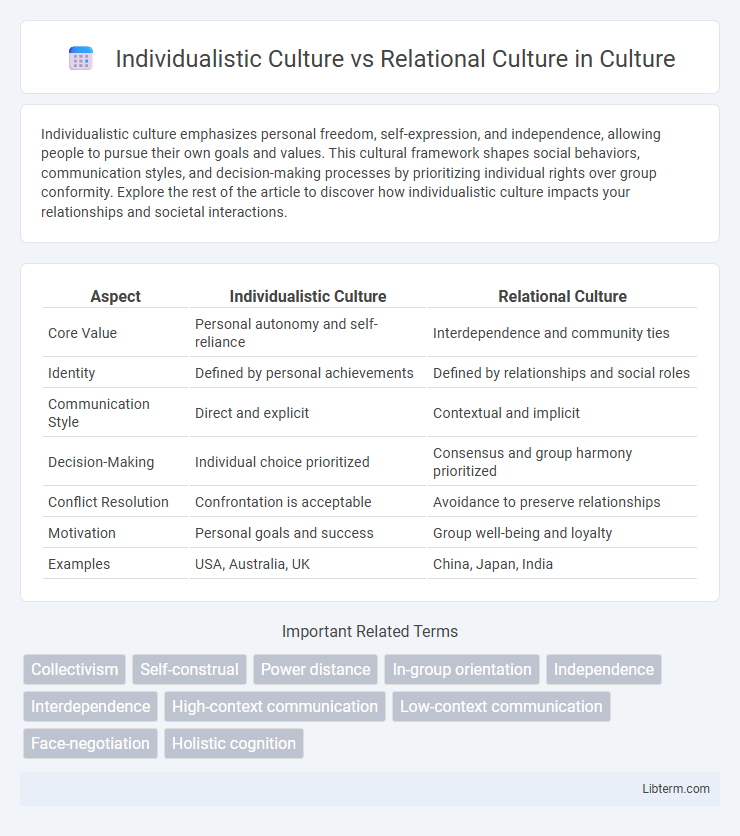Individualistic culture emphasizes personal freedom, self-expression, and independence, allowing people to pursue their own goals and values. This cultural framework shapes social behaviors, communication styles, and decision-making processes by prioritizing individual rights over group conformity. Explore the rest of the article to discover how individualistic culture impacts your relationships and societal interactions.
Table of Comparison
| Aspect | Individualistic Culture | Relational Culture |
|---|---|---|
| Core Value | Personal autonomy and self-reliance | Interdependence and community ties |
| Identity | Defined by personal achievements | Defined by relationships and social roles |
| Communication Style | Direct and explicit | Contextual and implicit |
| Decision-Making | Individual choice prioritized | Consensus and group harmony prioritized |
| Conflict Resolution | Confrontation is acceptable | Avoidance to preserve relationships |
| Motivation | Personal goals and success | Group well-being and loyalty |
| Examples | USA, Australia, UK | China, Japan, India |
Defining Individualistic and Relational Cultures
Individualistic cultures emphasize personal autonomy, self-expression, and individual goals, often valuing independence and self-reliance above group needs. Relational cultures prioritize interconnectedness, social harmony, and collective well-being, focusing on maintaining relationships and fulfilling group expectations. These cultural frameworks shape communication styles, decision-making processes, and social behaviors across societies.
Core Values and Beliefs: Individual vs Relational Focus
Individualistic cultures prioritize autonomy, personal achievement, and self-expression, emphasizing individual rights and independence as core values. Relational cultures center on interconnectedness, community, and collective well-being, valuing harmony, loyalty, and group cohesion as fundamental beliefs. The contrast lies in the focus on personal goals versus shared responsibilities, shaping communication styles and social behaviors in distinct ways.
Communication Styles in Both Cultures
Individualistic cultures emphasize direct, explicit communication where individuals express personal opinions clearly and prioritize self-expression and autonomy in conversations. In contrast, relational cultures favor indirect, context-sensitive communication that values harmony, group cohesion, and nonverbal cues to maintain relationships. Understanding these communication styles is crucial for effective cross-cultural interaction and minimizing misunderstandings.
Decision-Making Approaches: Independence vs Consensus
Individualistic cultures prioritize independence in decision-making, emphasizing personal autonomy and individual choice, often leading to quicker, self-driven outcomes. Relational cultures focus on consensus, valuing group harmony and collective agreement to ensure decisions reflect communal interests. This contrast affects workplace dynamics, negotiation styles, and leadership strategies, highlighting the importance of cultural awareness in global communication.
Social Relationships and Networking
In individualistic cultures, social relationships emphasize personal autonomy and self-expression, with networking primarily serving personal achievement and career advancement. Relational cultures prioritize interconnectedness, valuing group harmony and collective well-being, where social ties are deeply embedded in family and community obligations. Networking in relational cultures often involves reciprocal support and trust-building over time, reflecting long-term commitment rather than transactional exchanges.
Influence on Personal Identity and Self-Expression
Individualistic cultures emphasize personal autonomy and self-expression, encouraging individuals to define their identity through personal achievements and unique traits. In contrast, relational cultures prioritize interconnectedness and social harmony, shaping identity through group affiliations and relationships. This dynamic influences how people communicate, make decisions, and present themselves within their social contexts.
Conflict Resolution Methods
Individualistic cultures prioritize direct communication and assertiveness in conflict resolution, emphasizing personal rights and individual goals. Relational cultures favor indirect communication, seeking harmony and maintaining group cohesion by using compromise and empathy to resolve disputes. Understanding these cultural nuances is essential for effective conflict management in multicultural settings.
Work Ethic and Team Dynamics
In individualistic cultures, work ethic emphasizes personal achievement, independence, and self-motivation, driving employees to prioritize individual goals over collective outcomes. Relational cultures focus on collaboration, social harmony, and building strong interpersonal relationships, fostering team dynamics where group success and mutual support are paramount. Understanding these differences enhances leadership strategies, communication, and conflict resolution within diverse work environments.
Impact on Mental Health and Well-being
Individualistic cultures emphasize personal autonomy and self-expression, often leading to increased stress due to pressure for individual achievement and social isolation, which can negatively impact mental health. Relational cultures prioritize interconnectedness and community support, fostering a strong sense of belonging that enhances emotional well-being and resilience against psychological distress. Understanding these cultural dynamics is crucial for developing effective mental health interventions tailored to diverse social contexts.
Navigating Cultural Differences in a Globalized World
Navigating cultural differences in a globalized world requires recognizing that individualistic cultures prioritize personal autonomy and self-expression, while relational cultures emphasize group harmony and interconnectedness. Effective communication strategies involve adapting to diverse social norms by valuing both independent decision-making and relationship-building approaches. Multinational organizations benefit from cultural intelligence by fostering inclusive environments that respect individual goals and collective obligations simultaneously.
Individualistic Culture Infographic

 libterm.com
libterm.com